High Profile
Labour pains
Interview by Nick Spencer
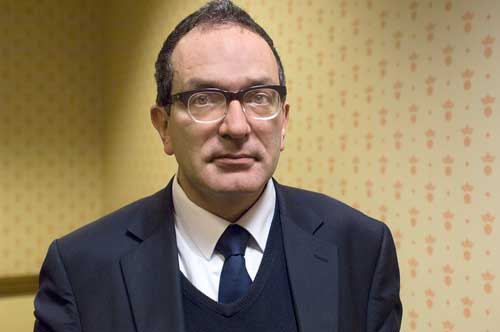
Dr Maurice Glasman, the controversial
social thinker who coined the term ‘blue Labour’, was ennobled
last November at the behest of Ed Miliband. Third
Way looked him up at the House of Lords.
Five years ago, the very idea that today you would be a
Labour peer would have seemed more than fantastic…
Oh, this story is fantastical. I recognise that – without any ego,
I hope.
You were born in Stamford Hill in north London 50 years ago. How
did that neighbourhood shape you?
We moved to Palmers Green [in north London] when I was
two-and-a-half. Jewish demographics, so from the East End to
Stamford Hill, then to the North Circular Road, to a
four-bedroomed, semi-detached house. I was the third child, so we
needed an extra room…
Suburban family values?
Completely. A love of the home – when I studied history,
I completely understood the Greek and Roman attachment to the
ancestral family home, the oikos and the
patrimonia. My mum was from a very poor family and for her
it was the first house owned in the family. She was the eldest of
five sisters and they all came over every Sunday, or we visited my
grandmother.
Very strong stress on family, religious observance – we were an
Orthodox family, of an English variety.
What did your father do for a living?
He had a small toy business, which had been my
grandfather’s.
Were your parents born in this country?
Yeah, both in London – but my grandparents were
immigrants. They all came over in 1905, but from different parts
of Europe: Russia, Ukraine, Romania, Poland.
Was there that sense of loyalty to the adopted country
that is so common in immigrants?
A real love and devotion to the country and its
people.
I grew up in a very strong Labour household that was equally
strongly monarchist. When I went through my republican period, when
I was about 15, I remember telling Mum that the Monarchy was an
unjust thing and she said, ‘But the Queen stayed during the war!
What are you saying?’
But it went much deeper than that: it was instilled in me that
only England – we spoke about ‘England’, I think – beat Fascism,
that this was the only country in Europe where Jews survived.
You developed a political consciousness pretty young…
Yeah, definitely. I thought that the world was unjust
and I read Michael Foot’s biography of Aneurin Bevan and I
felt: Why didn’t I join the Labour Party?
I went to the local branch meetings for a year and a half, and it
was a really horrible experience. Southgate was at that time a
very safe Conservative seat, the local Labour party was very
ideological – certainly, prototype progressive left – and I went in
the same way I went to synagogue: out of a kind of duty. You could
say that ‘blue Labour’ started right then.
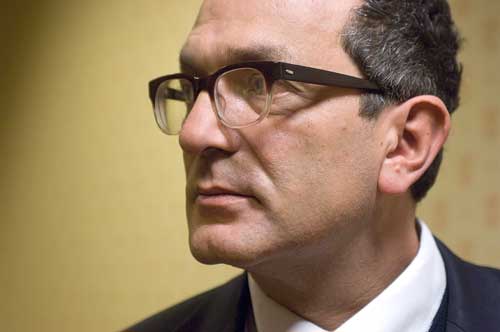
Did you rebel as a teenager?
I tried to, but the relationships were very strong. I
really loved my parents…
Did you rebel against your religion?
I did. I really did. I definitely stopped believing in God. But,
you know, I think that matters less to Jews. When I told my dad, ‘I
don’t believe in God, so I don’t know what the meaning of life is,’
he said: ‘Unfortunately, we are the meaning of each other’s lives.
So, honour your relationships and be nice to your mum!’
Had I asked you as a teenager what you wanted to be when
you grew up, what would you have said?
I would probably have said I’d like to play for Spurs – I
loved football, and I was quite good at it. I was picked for the
Hackney Under-11s but I couldn’t play on Saturdays – my mother
said, ‘Don’t blame me, blame God!’ I also played the trumpet, so I
would have said I wanted to be a musician. But I had no idea.
How did your expressly Jewish education form you?
At my primary school, it was appalling – it was targeted
completely at the brighter children. I was in the B stream and we
basically got some exercise books; by the time you got to the C
stream, I think you were just left to fend for yourself. But it was
a very loving school.
My secondary school was JFS, the Jews’ Free School. That was a
huge school, and a very rough one in lots of ways. I wasn’t good at
school: I was in loads of trouble – you know, there must be more to
life than this! But a teacher in the Sixth Form took a huge
interest in me and gave me one-to-one tuition and suddenly I was
selected for Oxbridge entrance. It was very surprising, is all I
can say. They cared for me and really encouraged me and I got an
exhibition to study history at Cambridge.
But then began another saga: in ’79, Cambridge was still
overwhelmingly public-school and it didn’t take me long to realise
that it was a finishing school for the ruling class. So, a massive
rebellion against being there – and against intellect. I couldn’t
leave, because my dad said it would break my mother’s heart, so I
played a lot of music and basically took the opportunity to try to
have sexual intercourse, you know, and take drugs. It’s a shameful
thing to say, but they were the three years I worked least in my
whole life.
Allowing that you didn’t do much work, do you think that
studying history helped to form your mind?
Don’t underestimate the power of the Ladybird books! That
was what I was brought up on… My A-level syllabus was the 17th
century, the English Civil War and the reckoning, so that gave me a
real understanding of the rights of freeborn Englishmen, and a real
interest in the role of Christianity, sort of, in English history.
It was very complicated for someone like me on the left. My heart
was with the parliamentary rebellion and yet I supported the
Monarchy in its denunciation of the enclosures [of common land]
and its confrontation with the City of London. I always saw the
labour movement very much as trying to reclaim some sort of status
for the working poor out of the humiliation of the enclosures,
which were a terrible injustice to the peasantry.
Obviously, I did O-level history and that was where I became
really Labour, studying the Industrial Revolution and [the
formation of the working class]. So, history and the study of
history inform my politics completely. I have always rooted it in
historical tradition.
Do you think that that historical grounding is generally
lacking in our political class today?
That’s the whole [argument] against PPE1 – three
abstract disciplines taught in a completely abstract way, so we
could be anywhere, we could be anyone, and so justice, rights, the
state become universal and the particularity of the country, which
has proved to be so durable, and actually quite remarkable, is
seen as at best an affectation but at worst a block to
modernisation.
You went on to study politics in York and then
Florence…
That was after I’d spent four years as a musician. The
[benefits] of music were, obviously, the girls, the drugs and the
money, but I realised that studying and writing were the things
that made me happy. So, I went to York and did a master’s in
political philosophy, on the idea of toleration (which was funded
by the Quakers).
Then, in the dog days of Thatcherism, I applied for a scholarship
to [the European University Institute in] Florence. I thought that
the food might be better, the weather – and, above all, the
atmosphere. And there for the first time I came across the whole
tradition of Catholic social thought, through conversation rather
than study. My Italian friends were, virtually all of them,
simultaneously Catholics and members of the Communist Party. In
England, this was completely inconceivable, and yet they were
great, they cared about the things that I cared about.
And then [I started reading Karl Polanyi],2 and that was
transformative – almost like a religious experience.
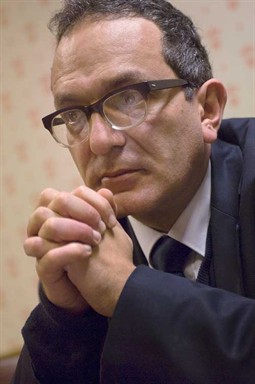 You referred to the ‘dog days’ of
Thatcherism. You were very unhappy with what her government was
doing, but the official opposition didn’t appeal to you either, did
it?
You referred to the ‘dog days’ of
Thatcherism. You were very unhappy with what her government was
doing, but the official opposition didn’t appeal to you either, did
it?
No, it absolutely didn’t. I began to realise that we had
two completely broken orthodoxies. We had this mad market
fundamentalism under Margaret Thatcher, the abandonment of any
conception of the common good, the enormous transfer of wealth from
poor to rich – it was horrible. (I saw its cultural energy – I
mean, my mum’s family was a case in point. Her sisters married
people of their own class, while my mum married up, and while we
were Labour, all her sisters went Conservative. They thought that
Labour was the party of no morality, of penalising people who’d
worked. They all went on to own their own homes, and that was a
very big deal in their lives.) But then what I saw in the Labour
Party was just a statist, bureaucratic thing that I just couldn’t
feel any affinity with.
Why did you return from Italy in 1995? Had you had enough
of the good life?
Unfortunately, my dad died – and I really loved my dad a
lot, and I’d thought that he’d live forever, you know? And that
left my mum on her own. I moved back from my lovely flat in Fiesole
to Palmers Green. I got a little job at London Metropolitan –
London Guildhall University as it was then – and that was very
hard.
When did you become involved with ‘citizen
organising’?
That really begins roundabout 1999. A very important
person in this story is the chaplain of the university, William
Taylor. I was writing my book on Catholic social thought,3 which
he’d never heard of, and we used to talk often together and a real
friendship developed.
I’m very interested in cities, and London Metropolitan is right
on the edge of the City. They were turning Spitalfields Market into
offices and William was very active in resisting this development,
to keep some public space, and for some reason his group thought I
had some insight into how the campaign should go. We submitted a
court order and they were stopped from building, and then William
and I took a petition to the House of Lords. It was during the
Lords hearing that I was introduced to London Citizens4 and I was
invited to join them on a retreat on the concept of family life.
They were overwhelmingly Christians – some were Muslims – and I
thought they were going to talk about sex; but they ended up
[discussing] the living wage. And that was my transformational
moment. It was amazing.
And thus began the long march home. I mean, imagine getting this
far and realising that your mum was right! These people I was
working with were her, you know? Completely. ‘You work, you love
your children, you love your parents, you love your country…’ I had
to shed a lot of progressive baggage.
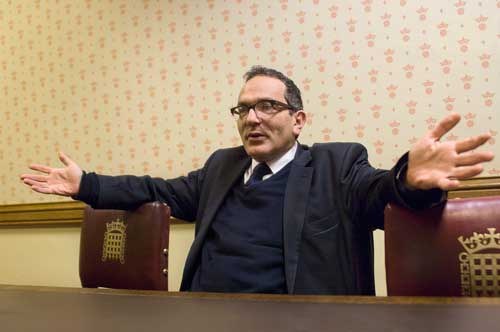
And this is in the heyday of New Labour, as it becomes
very clear that ‘Blairism’ is thoroughly individualistic –
And utilitarian, fundamentally elitist and simultaneously
completely uncritical of globalisation and completely uncritical of
managerialism. Gordon Brown begins to represent in my mind
everything I can’t stand – completely cynical on the one hand,
incredibly moralistic on the other, completely statist and
completely uncritical of capitalism.
So, the irony is that at the very time when you were
returning to a form of political activism, the formal vessels of
British politics were most alien to you.
To make it worse, I’m completely estranged not only from
New Labour but also from the left, the opposition to New Labour.
That’s partly to do with its attitude to Israel – I have never
been a Zionist, but nor do I think that Israel is the worst country
in the world; and yet I’ve found a really weird Israel-hate in my
colleagues at work. Also, I really don’t like [the left’s] attitude
to religious people – there’s a real contempt. I begin to think:
Well, I may not believe in God but I definitely believe in sin, and
these self-righteous people are so convinced that they’re on the
side of the good guys… They’ve got no conception of how they can
humiliate people.
And then [in 2008] the financial crash comes – the biggest
transfer of wealth from poor to rich since the Norman Conquest –
and, besides ‘This is terrible!’, the left is silent. But then
there’s Phillip [Blond] telling me that the building societies and
mutual societies and co-op burial societies and the trade-union
movement and the labour movement are, in fact, Tory, because
Labour is so irredeemable. And that is out of the question.
And then on December 31, 2008 my mum dies, and I feel this very
strong desire to honour her; and that’s how ‘blue Labour’ was
born. I called it ‘blue Labour’ really as a provocation. Something
needed to be said after the crash that there was a Labour
tradition that was not exhausted by this, that was in fact vital
and perfect for this time but had been completely submerged by a
progressive, elitist, technocratic, managerial consensus.
I think the disaffection with Labour was very deep, generally
speaking, but I honestly had no idea that it would engage people’s
interest in the way that it did. (If I’d have known how interested
people would be, I would have been much more careful in what I
said, you know – but I can’t rewrite things.) The politics I was
doing, which was faith-based, local-community politics on
living-wage and family housing issues, was a joy, you know, and to
some extent I just wanted to share: Look! This is great! The
initial premise was simply that something needs to be said.
We have to talk about what are the conditions of the common life,
how can we renew the democratic traditions of the country; and so
we have to talk about immigration and how we can build a common
life between locals and immigrants – that’s very important in terms
of the bottom end of the labour market…
Why do you think you were made a peer?
I think that there was a genuine desire to acknowledge
community organising, to acknowledge that there were ideological
problems and to legitimate what I was saying. It was incredibly
generous – that’s how I take it – because really, with the best
will in the world, I wasn’t going to stop saying things that
really upset – and there is no way of doing it that doesn’t upset
– the fundamental orthodoxies of progressive Labour
politics.
It’s not a simple story. I’ve made a lot of mistakes on the way
and I’ve got a huge amount to learn; but I’m Labour, I try to work
within the Labour tradition – of people associating together – and
the more I discover of it, the more beautiful it is. I mean, Labour
healed the Reformation in that it was the first political movement
in which Catholic and Protestant could work together – in the
London Dock Strike [in 1889], in the co-operative burial societies
– in order to seek a common good, a common wealth. It was a
miraculous achievement.
How receptive do you think the party is to ‘blue
Labour’?
What I find is – setting aside my undeliberate
provocations – that there is a huge interest in this from local
Labour parties. The local Fabians, for example, invite me all the
time. And outside London this is definitely speaking to people.
There’s a genuinely good conversation going on with trade unions,
and a very interesting conversation with the leadership. And a real
intellectual interest – that is the remarkable thing. The academic
critiques have not been hateful – there has been a real recognition
of problems with the existing paradigm.
What I call the ‘progressive’ or ‘Keynesian’ orthodox positions
still have a tendency to demonise it – you know, that it is
reactionary, racist, sexist… But it’s not – I mean, with London
Citizens I’ve worked, overwhelmingly, with low-paid immigrant
women – so they’re running into a bit of difficulty with that. You
know, this is an internal argument within the Labour Party; it’s
difficult family business, in the guts of the beast. A lot of the
time I could easily say I’m misunderstood, but I’m not. People
understand perfectly well what this is about; they just don’t like
it necessarily.
The ultimate division is between those who hold of a possibility
of relational politics, a politics that can be transformational
because of the relationships you build between people, and those
who believe that the good of politics is to protect you from those
relationships. And this disrupts all the pre-existing divisions
[of] left and right. Is [politics] ultimately about individual
autonomy and your fulfilment of yourself or is it the fulfilment of
yourself in relation with others? And that’s about democracy and
rights, corporate governance, tax…
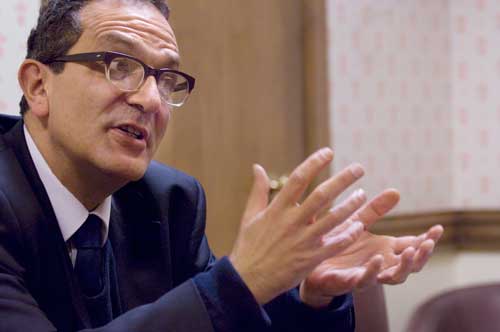
What role does Christianity have to play in this
vision?
For me, a massive one. There’s a very diverse Christian
[tradition] in this country, Catholic and Nonconformist as well
as Anglican; and each of them in their different ways speaks of the
transformative power of association to resist the domination of the
state and the market. The Labour tradition and the Christian
tradition are completely linked, and it’s about protecting the
status of
the person from commodification and the idea that our bodies and
our natural environment are just to be bought and sold. In the
politics of the common good, there has never been a greater need
for the gifts that the Christian tradition brings, of which the
greatest is love. We’ve got no love in the system.
I’ve said often that the most important person in the history of
the labour movement is Jesus. It’s very easy for me as a Jew to
take endless inspiration [from him] – and I do. As a carpenter, as
a man, he spoke about resistance to the boss and resistance to the
king, and he said, you know, that through association you could
resist the domination of the worldly powers, the market and the
state. And that is his huge gift to Labour.
I’ve spent a lot of time telling people in Labour that it’s very,
very important that there is not just Christian engagement but
Christian engagement in all its diversity. My only fear is that
this won’t happen.